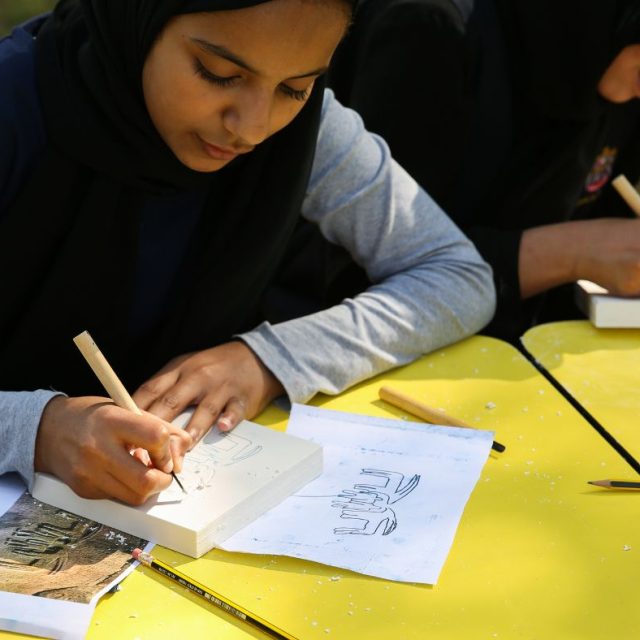CULTURAL IDENTITY AND INNOVATION: ABU DHABI’S JOURNEY TO BECOMING A GLOBAL CULTURAL HUB
With a population of around 2.5 million Abu Dhabi is the capital and second-most populous city of the United Arab Emirates

Cultural Heritage
Abu Dhabi is rich in ancient history, with many important archaeological sites and settlements. Most notable is the UNESCO World Heritage Site of Al Ain which reveals over 5,000 years of civilisation. Archaeological discoveries on Marawah Island in the Al Dhafra provide a comprehensive picture of life in the UAE around 8,000 years ago. Recent excavations on Ghaga Island, west of Abu Dhabi city, have also revealed evidence of the earliest known settlements in the Arabian Peninsula, dating back over 8,500 years. As a result, the city has a strong focus on Heritage Conservation. The city’s population has tripled in size over the past 20 years with about 80 per cent of citizens from non-Emirati origin. It’s economy continues to diversify, moving away from a reliance on oil and with culture and tourism as an important driver for the city’s development.
Embracing Change
With a strong vision for the future, Abu Dhabi as growing as a destination for business and leisure, with state-of-the-art cultural landmarks playing a part in attracting tourism and new investment. The city is also successfully cementing its reputation as a hub for arts and culture in the region and the world. The Saadiyat Cultural District on Saadiyat Island, close to the city centre, is home to the Louvre Abu Dhabi (opened in 2017) and the interfaith Abrahamic Family House (opened in 2023). The city also has a rapidly growing arts sector and will be home to the Zayed National Museum, Natural History Museum Abu Dhabi and Guggenheim Abu Dhabi all due to open in 2025.
This capital city is also known around the world for its contemporary architecture, multicultural business districts and innovative sustainable projects, in particular its harvesting of solar energy. The city is becoming a centre for research and innovation through strategic vision and investments and has diversified its economy, reducing its reliance on oil revenues. The city’s ambitious initiatives have paved the way for a knowledge-based economy with a focus on technology, renewable energy, and sustainable practices.
Amidst the skyscrapers and bustling streets, traditional souks, heritage villages, and art galleries proudly display the emirate’s rich history. This preservation of cultural heritage ensures that the city remains deeply rooted in its past while charting a path towards a progressive future. With such rapid growth come new challenges for Abu Dhabi’s cultural scene and the role of cultural policymaking has drastically grown in importance. A fundamental and longstanding challenge is the need to focus on Emirati identity and also recognise and celebrate the new diverse population with their distinct identities and forms of cultural expression.
Another challenge is to bolster the participation of civil society, including Non-Governmental Organisations and businesses in the culture sector. This in turn will help to strengthen the skills and opportunities for those working or looking to be part of the creative industries.

The Role of The Policymaker
Taking on the lead is the Department of Culture and Tourism – Abu Dhabi (DCT Abu Dhabi) who are working in collaboration with key agencies in the public and private sectors to establish policies for the development and sustainability of the city’s cultural infrastructure.
For example, the newly founded Creative Media Authority (2021) has a remit to nurture and encourage content creation and filmmaking, supporting the Middle East and North Africa (MENA) region’s media industry. The ambition is to become a global content hub by producing policies and programmes that strengthen the city’s cultural heritage outreach with an inclusive vision, reflecting the diversity of the population.
Other schemes like the renovation project Warehouse 421 at Mina Zayed (MiZa) have been successful in creating not only a cultural destination and exhibition space but also a hotbed for initiatives funded by philanthropists and placemakers like the Salama bint Hamdan Al Nahyan Foundation, who support the arts, culture, heritage, education, and health.
The Future
Policy makers recognise that the collective memory of the people of Abu Dhabi is an invaluable resource and consider the artistic talents within the community a fundamental part of the enduring heritage of the city. They accept the challenge to move away from the oil state stereotype and embrace all that a modern city and an increasingly diverse population brings.
Taking a long term and sustainable approach the city is invested in empowering cultural programming by independent agencies and encouraging creative enterprises through innovative projects — as well as stimulated through community outreach and education programmes — to bring more people into the culture and the creative industries. In turn, this will ensure that both the old and new cultures reach wider audiences, broaden the appeal and inspire creativity for future generations.
Images copyright © Getty Images / Canva




